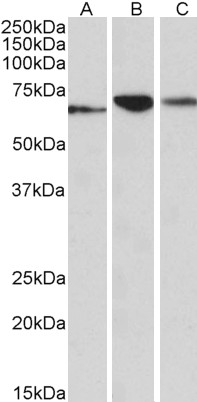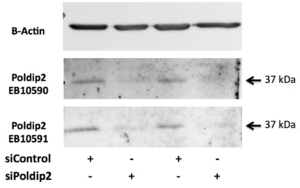POLDIP2 Antibody (internal region)
Peptide-affinity purified goat antibody
- SPECIFICATION
- CITATIONS
- PROTOCOLS
- BACKGROUND

Application
| WB, E |
|---|---|
| Primary Accession | Q9Y2S7 |
| Other Accession | NP_056399.1, 26073, 67811 (mouse) |
| Reactivity | Human, Mouse, Rat |
| Predicted | Dog |
| Host | Goat |
| Clonality | Polyclonal |
| Concentration | 0.5 mg/ml |
| Isotype | IgG |
| Calculated MW | 42033 Da |
| Gene ID | 26073 |
|---|---|
| Other Names | Polymerase delta-interacting protein 2, 38 kDa DNA polymerase delta interaction protein, p38, POLDIP2, PDIP38, POLD4 |
| Dilution | WB~~1:1000 E~~N/A |
| Format | 0.5 mg/ml in Tris saline, 0.02% sodium azide, pH7.3 with 0.5% bovine serum albumin |
| Storage | Maintain refrigerated at 2-8°C for up to 6 months. For long term storage store at -20°C in small aliquots to prevent freeze-thaw cycles. |
| Precautions | POLDIP2 Antibody (internal region) is for research use only and not for use in diagnostic or therapeutic procedures. |
| Name | POLDIP2 {ECO:0000303|PubMed:26984527, ECO:0000312|HGNC:HGNC:23781} |
|---|---|
| Function | Involved in DNA damage tolerance by regulating translesion synthesis (TLS) of templates carrying DNA damage lesions such as 8oxoG and abasic sites (PubMed:24191025). May act by stimulating activity of DNA polymerases involved in TLS, such as PRIMPOL and polymerase delta (POLD1) (PubMed:24191025, PubMed:26984527). |
| Cellular Location | Mitochondrion matrix. Nucleus Note=Mainly localizes to the mitochondrial matrix; a small fraction localizes in the nucleus. |

Thousands of laboratories across the world have published research that depended on the performance of antibodies from Abcepta to advance their research. Check out links to articles that cite our products in major peer-reviewed journals, organized by research category.
info@abcepta.com, and receive a free "I Love Antibodies" mug.
Provided below are standard protocols that you may find useful for product applications.
References
Complex sense-antisense architecture of TNFAIP1/POLDIP2 on 17q11.2 represents a novel transcriptional structural-functional gene module involved in breast cancer progression. Grinchuk OV, Motakis E, Kuznetsov VA, BMC genomics 2010 11 Suppl 1 : S9. PMID: 20158880
If you have used an Abcepta product and would like to share how it has performed, please click on the "Submit Review" button and provide the requested information. Our staff will examine and post your review and contact you if needed.
If you have any additional inquiries please email technical services at tech@abcepta.com.













 Foundational characteristics of cancer include proliferation, angiogenesis, migration, evasion of apoptosis, and cellular immortality. Find key markers for these cellular processes and antibodies to detect them.
Foundational characteristics of cancer include proliferation, angiogenesis, migration, evasion of apoptosis, and cellular immortality. Find key markers for these cellular processes and antibodies to detect them. The SUMOplot™ Analysis Program predicts and scores sumoylation sites in your protein. SUMOylation is a post-translational modification involved in various cellular processes, such as nuclear-cytosolic transport, transcriptional regulation, apoptosis, protein stability, response to stress, and progression through the cell cycle.
The SUMOplot™ Analysis Program predicts and scores sumoylation sites in your protein. SUMOylation is a post-translational modification involved in various cellular processes, such as nuclear-cytosolic transport, transcriptional regulation, apoptosis, protein stability, response to stress, and progression through the cell cycle. The Autophagy Receptor Motif Plotter predicts and scores autophagy receptor binding sites in your protein. Identifying proteins connected to this pathway is critical to understanding the role of autophagy in physiological as well as pathological processes such as development, differentiation, neurodegenerative diseases, stress, infection, and cancer.
The Autophagy Receptor Motif Plotter predicts and scores autophagy receptor binding sites in your protein. Identifying proteins connected to this pathway is critical to understanding the role of autophagy in physiological as well as pathological processes such as development, differentiation, neurodegenerative diseases, stress, infection, and cancer.




